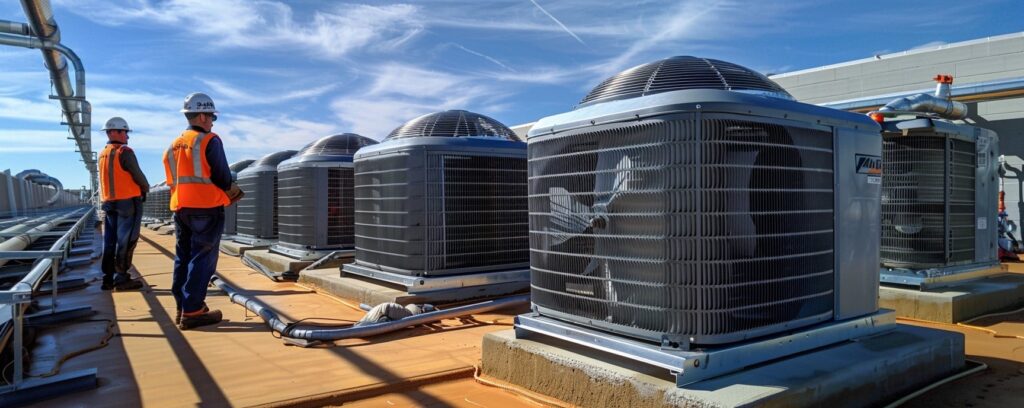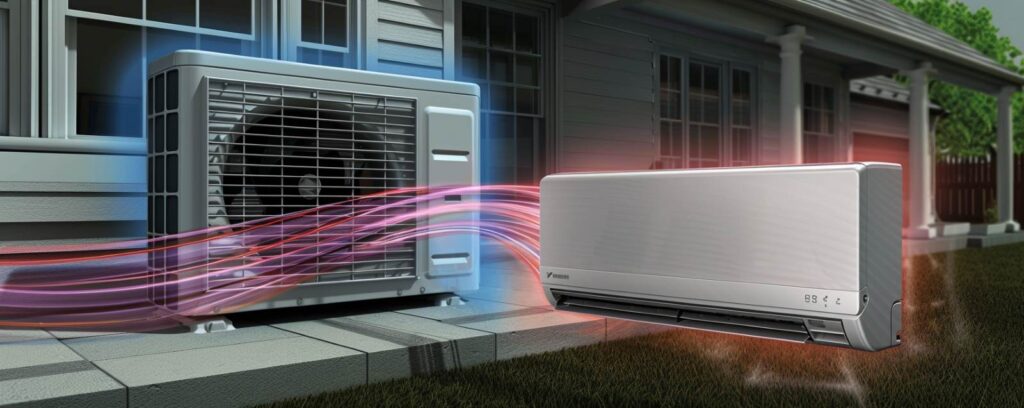In an era where climate control is not just a luxury but a necessity, the demand for skilled Heating, Ventilation, and Air Conditioning (HVAC) professionals continues to soar. Across the sprawling cities of the United States, HVAC technicians ensure the comfort of homes, offices, and industrial facilities, regardless of the season.
With the sector’s steady demand, HVAC salaries across the U.S. have become a focal point for those within the trade and those considering a career in this essential field.
This article aims to shed light on the lucrative opportunities that the field offers by exploring the ten U.S. cities where HVAC technicians earn the highest salaries. Whether driven by technological hubs, extreme climates, or urban density, each city presents a unique set of factors contributing to its position on this list.
Through understanding HVAC salaries across the US, prospective technicians can navigate the landscape of opportunities and tailor their career paths towards the most promising locales.
The Role of HVAC Technicians
Heating, Ventilation, and Air Conditioning (HVAC) technicians are the unsung heroes behind the comfort and air quality in our homes, workplaces, and public spaces.
These skilled professionals install, maintain, and repair HVAC systems, ensuring that indoor environments remain habitable regardless of the weather outside.
The scope of their work ranges from residential settings to large industrial and commercial buildings, covering systems that heat, cool, and provide essential ventilation.
Why HVAC Technicians Are in Demand
The continuous need for new installations, maintenance, and upgrades of HVAC systems, driven by construction growth, technological advancements, and regulatory updates, underscores the stable demand for HVAC technicians.
Additionally, the push towards energy efficiency and reducing greenhouse gas emissions has led to an increase in retrofitting existing systems to meet environmental standards, further solidifying the profession’s indispensability.
Factors Influencing HVAC Salaries Across the U.S.
When considering HVAC salaries across the U.S., several key factors come into play, influencing how much professionals in the field can expect to earn. These include:
Geographic Location
The cost of living and climate in different regions significantly impact HVAC salaries. Areas with extreme weather conditions or high living costs often offer higher wages to attract skilled technicians.
Experience and Education
Like many professions, experience, and education level in the HVAC industry directly affect earning potential.
Technicians with several years of experience and certifications from reputable organizations, such as North American Technician Excellence (NATE) or the Air Conditioning Contractors of America (ACCA) , tend to command higher salaries.
Industry Demand
Local demand for HVAC services also plays a crucial role. Cities with booming construction sectors or regions experiencing significant population growth often have higher demand for HVAC installations and maintenance, driving up wages.
By understanding these factors, aspiring and current HVAC technicians can better navigate their career paths and seek opportunities that align with their financial goals and lifestyle preferences.
Overview of HVAC Salaries Across the U.S.
The landscape of HVAC technician salaries varies widely across the United States, influenced by factors such as local demand, cost of living, and climate.
Based on recent data from the BLS, here are the ten cities where HVAC technicians can find the highest mean wages.
Highest Paying Cities for HVAC Technicians
1. San Jose-Sunnyvale-Santa Clara, CA
- Hourly Mean Wage: $42.79
- Annual Mean Wage: $88,990
San Jose and its surrounding areas are known for their booming technology sector, which drives up both the cost of living and the demand for skilled HVAC technicians to maintain comfortable, high-tech environments.
2. San Francisco-Oakland-Hayward, CA
- Hourly Mean Wage: $38.61
- Annual Mean Wage: $80,300
As another key hub of innovation and tech, the San Francisco Bay Area offers significant opportunities for HVAC professionals, mirroring its high cost of living with competitive salaries.
3. Minneapolis-St. Paul-Bloomington, MN-WI
- Hourly Mean Wage: $36.29
- Annual Mean Wage: $75,490
The Twin Cities’ diverse climate and robust economy contribute to a strong demand for HVAC services, reflecting in attractive wages for the industry’s technicians.
4. Fairbanks, AK
- Hourly Mean Wage: $36.05
- Annual Mean Wage: $74,990
Extreme weather conditions in Fairbanks necessitate reliable HVAC systems, leading to higher wages for technicians proficient in maintaining them.
5. Anchorage, AK
- Hourly Mean Wage: $35.42
- Annual Mean Wage: $73,660
Similar to Fairbanks, Anchorage’s climate creates a consistent demand for skilled HVAC professionals, offering substantial earning potential.
6. Kahului-Wailuku-Lahaina, HI
- Hourly Mean Wage: $35.32
- Annual Mean Wage: $73,470
Hawaii’s unique climate and the tourism industry’s needs for HVAC services drive the wages for technicians in this picturesque locale.
7. New York-Newark-Jersey City, NY-NJ-PA
- Hourly Mean Wage: $35.01
- Annual Mean Wage: $72,820
The immense urban landscape of New York and its surrounding areas present diverse opportunities for HVAC technicians, from residential to large-scale commercial systems.
8. Urban Honolulu, HI
- Hourly Mean Wage: $34.94
- Annual Mean Wage: $72,660
Urban Honolulu combines the demand generated by its dense population and tourist sectors, leading to competitive wages for HVAC professionals.
9. Boston-Cambridge-Nashua, MA-NH
- Hourly Mean Wage: $34.73
- Annual Mean Wage: $72,230
Boston’s historical buildings and educational institutions, alongside its weather, create a varied demand for HVAC expertise.
10. Santa Cruz-Watsonville, CA
- Hourly Mean Wage: $34.65
- Annual Mean Wage: $72,060
Close to the tech epicenter of Silicon Valley, Santa Cruz offers lucrative opportunities for HVAC technicians amidst its high cost of living.
Each of these cities reflects the broader trends affecting HVAC salaries across the U.S., from the influence of local industries to environmental factors.
The demand for skilled HVAC technicians is expected to grow, making these cities attractive destinations for professionals looking for career advancement and higher earning potential.
The Next Ten: Cities with Competitive HVAC Salaries
While the top ten cities stand out for their high HVAC salaries, there are several other locales where HVAC technicians can earn competitive wages.
Here’s a look at the next ten cities, showcasing the diverse opportunities across the United States.
Cities Offering Promising HVAC Salaries
Ann Arbor, MI
- Hourly Mean Wage: $34.35
- Annual Mean Wage: $71,450
Ann Arbor’s blend of educational institutions and a strong healthcare sector creates a steady demand for HVAC services, reflected in its competitive salaries.
New Haven, CT
- Hourly Mean Wage: $34.24
- Annual Mean Wage: $71,220
With its historic architecture and educational campuses, New Haven requires skilled HVAC technicians to maintain its diverse buildings, offering attractive wages in return.
Trenton, NJ
- Hourly Mean Wage: $34.21
- Annual Mean Wage: $71,150
Trenton’s government and service sectors contribute to a consistent need for HVAC expertise, making it a lucrative city for professionals in the industry.
West North Dakota nonmetropolitan area
- Hourly Mean Wage: $34.00
- Annual Mean Wage: $70,730
The unique demands of this nonmetropolitan area, including the oil industry, generate high wages for HVAC technicians willing to work in more remote locations.
Seattle-Tacoma-Bellevue, WA
- Hourly Mean Wage: $33.85
- Annual Mean Wage: $70,410
Seattle’s booming tech industry and diverse climate conditions create a high demand for HVAC professionals, offering substantial salaries.
Bridgeport-Stamford-Norwalk, CT
- Hourly Mean Wage: $33.68
- **Annual Mean Wage: **$70,050
This area’s high cost of living and affluent population drive the need for advanced HVAC systems and skilled technicians to manage them.
Milwaukee-Waukesha-West Allis, WI
- Hourly Mean Wage: $33.46
- Annual Mean Wage: $69,590
Milwaukee’s manufacturing and brewing industries, along with its residential needs, offer HVAC technicians solid earning potential.
Santa Rosa, CA
- Hourly Mean Wage: $33.07
- Annual Mean Wage: $68,780
Nestled in wine country, Santa Rosa’s residential and commercial sectors provide a steady stream of HVAC work, reflected in competitive salaries.
Hartford-West Hartford-East Hartford, CT
- Hourly Mean Wage: $33.05
- Annual Mean Wage: $68,750
Hartford’s insurance and financial services industries, alongside its seasonal climate, ensure a consistent demand for HVAC services.
Los Angeles-Long Beach-Anaheim, CA
- Hourly Mean Wage: $33.02
- Annual Mean Wage: $68,680
The vast urban sprawl of Los Angeles and its diverse economic sectors create ample opportunities for HVAC technicians, with wages to match the city’s living costs.
These cities, while not in the top ten, still offer significant opportunities for HVAC professionals looking for competitive salaries and a variety of work environments.
From bustling metropolitan areas to unique nonmetropolitan regions, the HVAC industry continues to thrive across the U.S., providing a wealth of options for those in the field.
Job Outlook for HVAC Technicians
The future looks bright for those in the HVAC field, with promising employment projections suggesting a steady demand for skilled technicians.
According to the U.S. Bureau of Labor Statistics (BLS) Employment Projections program, employment of heating, air conditioning, and refrigeration mechanics and installers is expected to grow by 6 percent from 2022 to 2032.
This growth rate is faster than the average for all occupations, which stands at 3 percent, and also outpaces the projection for installation, maintenance, and repair occupations overall, predicted at 4 percent growth.
Several key factors contribute to the optimistic job outlook for HVAC professionals:
Construction and Retrofitting
The ongoing construction of commercial and residential buildings is a primary driver of employment growth in the HVAC sector. As more structures are built, the need for new HVAC installations increases correspondingly.
Moreover, the growing number of sophisticated climate-control systems being installed in these buildings further bolsters the demand for qualified technicians.
Repair and Replacement Needs
A significant portion of HVAC work involves the repair and replacement of existing systems. With an increasing emphasis on energy efficiency and pollution reduction, many existing HVAC systems are being retrofitted, upgraded, or replaced entirely.
This trend not only reflects the industry’s adaptation to environmental concerns but also represents a substantial area of opportunity for HVACR technicians.
Projected Openings
The BLS estimates that there will be about 37,700 openings for heating, air conditioning, and refrigeration mechanics and installers each year on average over the decade.
These openings are anticipated as a result of the need to replace workers who transition to different occupations or exit the labor force, including retirement.
Summary of Employment Projections
- Occupational Title: Heating, air conditioning, and refrigeration mechanics and installers
- Projected Employment, 2022: 415,800
- Projected Employment, 2032: 438,800
- Percent Change, 2022-32: 6%
- Numeric Change, 2022-32: 23,000
This growth underscores the vital role that HVAC technicians play in our society, ensuring the comfort and safety of indoor environments across the United States.
With the combination of new construction, technological advancements, and an emphasis on sustainability, the HVAC industry is poised for continued expansion, offering a stable and rewarding career path for those entering the field.
Growth Drivers in the HVAC Industry
The HVAC (Heating, Ventilation, and Air Conditioning) industry is witnessing significant growth, driven by several key factors. Understanding these drivers is crucial for those within the industry to adapt and thrive in an evolving landscape.
Technological Advancements
Innovation in HVAC technology is at the forefront of industry growth. The development of more efficient, smarter climate-control systems is transforming how residential and commercial buildings are cooled and heated.
Innovations such as smart thermostats, which allow for more precise control of indoor environments, and advances in energy-efficient systems are not only improving the quality of HVAC services but also reducing environmental impact.
Environmental Regulations
Governments around the world are implementing stricter environmental regulations to combat climate change, directly influencing the HVAC industry. Regulations aimed at reducing carbon emissions and improving energy efficiency are increasing the demand for newer, more efficient HVAC systems.
These regulatory changes require HVAC professionals to be knowledgeable about the latest technologies and compliance standards, further emphasizing the importance of continuous education and certification in the field.
Focus on Energy Efficiency and Sustainability
There’s a growing emphasis on energy efficiency and sustainability within the construction and renovation of buildings.
This trend is driving the demand for HVAC systems that can operate more efficiently while minimizing energy consumption and reducing costs for homeowners and businesses.
As a result, HVAC technicians with expertise in energy-efficient and sustainable systems are increasingly in demand.
Increasing Demand for Indoor Air Quality
The global pandemic has heightened awareness and concern over indoor air quality (IAQ). As individuals spend more time indoors, there is a greater focus on ensuring that indoor environments are safe and healthy.
This has led to an increased demand for HVAC systems equipped with advanced air purification and filtration technologies, opening new avenues for growth in the HVAC industry.
Retrofitting and Upgrading Existing Systems
With many existing buildings equipped with outdated HVAC systems, there is a significant opportunity for the industry in retrofitting and upgrading these systems to meet current standards for efficiency and environmental impact.
This area of work not only supports the industry’s growth but also contributes to the overall goal of reducing energy consumption and enhancing the sustainability of buildings.
The convergence of these factors—technological advancements, environmental regulations, a focus on energy efficiency and sustainability, increased demand for indoor air quality, and the need for retrofitting—paints a picture of an industry that is not just growing but also evolving.
For HVAC professionals, staying abreast of these trends and continuing to develop their skills and knowledge will be key to capitalizing on the opportunities presented by the industry’s growth.
Preparing for a Career in HVAC
Entering the HVAC industry offers a promising career path filled with opportunities for growth and advancement. Here’s what aspiring HVAC technicians need to know about getting started in this dynamic field.
Education and Training
The foundation of a career in HVAC begins with obtaining the proper education and training.
Many technicians start their journey with a high school diploma or GED, followed by enrolling in technical or vocational school programs that specialize in HVAC training.
These programs typically cover topics such as system design, installation, maintenance, repair, and diagnostics. Courses may also delve into refrigeration, electrical circuits, and blueprints, providing a comprehensive understanding of the field.
Apprenticeships
Apprenticeships offer another valuable pathway into the HVAC industry, combining on-the-job training with classroom instruction.
These programs can last between three to five years and are sponsored by professional associations, trade unions, or individual employers.
Apprentices gain hands-on experience under the guidance of experienced technicians while earning a wage, making it a practical option for many.
Certification
Certification plays a crucial role in the HVAC industry, often required by employers and sometimes mandated by state regulations.
The most recognized certifications in the field include the EPA Section 608 certification, which is essential for technicians who work with refrigerants, and certifications from organizations like North American Technician Excellence (NATE) and the Air Conditioning Contractors of America (ACCA) .
Obtaining these certifications demonstrates a technician’s knowledge and expertise, potentially leading to better job opportunities and higher wages.
Continuous Learning and Advancement
The HVAC field is continually evolving due to technological advancements and changing regulations. Successful technicians commit to lifelong learning, staying up-to-date with the latest trends and innovations.
This may involve pursuing additional certifications, attending workshops, and participating in continuing education courses.
Such dedication not only enhances a technician’s skill set but also broadens their career prospects and potential for advancement.
Networking and Professional Development
Engaging with professional organizations and networks can provide invaluable resources, mentorship, and career advancement opportunities.
Associations like the Air Conditioning, Heating, and Refrigeration Institute (AHRI) and local HVAC chapters offer forums for professionals to connect, share knowledge, and stay informed about industry developments.
By following these steps, aspiring HVAC technicians can prepare themselves for a successful and rewarding career in a field that offers both stability and growth potential.
With the right education, training, and certifications, individuals can position themselves to take advantage of the numerous opportunities the HVAC industry has to offer.
Take the Next Step in Your HVAC Career
As we wrap up our exploration of the HVAC industry’s promising landscape, it’s clear that the demand for skilled HVAC technicians is on the rise, driven by technological advancements, environmental regulations, and a growing focus on energy efficiency and indoor air quality.
The cities across the U.S. with the highest HVAC salaries underscore the lucrative opportunities available to those with the right skills and certifications.
For those considering a career in this dynamic field, the path is paved with potential. By pursuing education, training, and certification, aspiring technicians can prepare themselves to meet the industry’s evolving demands. Continuous learning and professional development will further enhance your capabilities and career prospects.
Whether you’re just starting out or looking to advance in the HVAC field, now is the time to take action. Explore educational programs, seek out apprenticeships, and pursue certifications that will set you apart in the job market.
Engage with professional organizations to expand your network and stay abreast of the latest industry trends and technologies.
The HVAC industry offers a stable and rewarding career path for those ready to embrace the opportunities it presents.
Begin your journey today, and position yourself to thrive in a field that promises growth, innovation, and the satisfaction of making a tangible difference in people’s lives and the environment.




